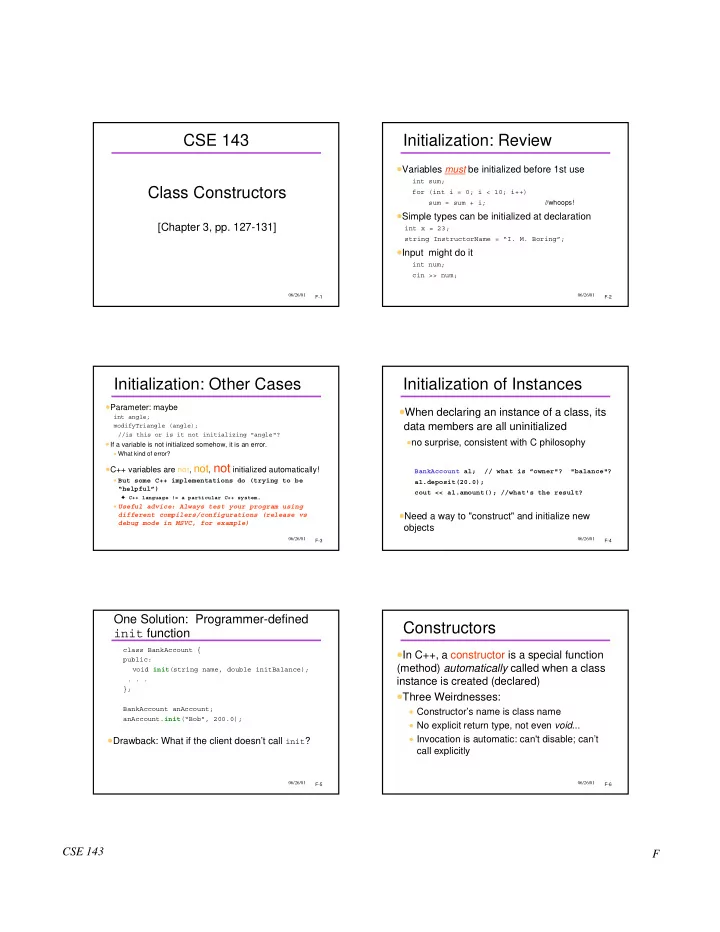

CSE 143 Initialization: Review • Variables must be initialized before 1st use int sum; Class Constructors for (int i = 0; i < 10; i++) sum = sum + i; //whoops! • Simple types can be initialized at declaration [Chapter 3, pp. 127-131] int x = 23; string InstructorName = “I. M. Boring”; • Input might do it int num; cin >> num; 06/26/01 06/26/01 F-1 F-2 Initialization: Other Cases Initialization of Instances • Parameter: maybe • When declaring an instance of a class, its int angle; data members are all uninitialized modifyTriangle (angle); //is this or is it not initializing "angle"? • no surprise, consistent with C philosophy • If a variable is not initialized somehow, it is an error. • What kind of error? • C++ variables are not, not , not initialized automatically! BankAccount a1; // what is ”owner"? "balance"? • But some C++ implementations do (trying to be a1.deposit(20.0); “helpful”) cout << a1.amount(); //what's the result? ✦ C++ language != a particular C++ system. • Useful advice: Always test your program using different compilers/configurations (release vs • Need a way to "construct" and initialize new debug mode in MSVC, for example) objects 06/26/01 06/26/01 F-3 F-4 One Solution: Programmer-defined Constructors init function class BankAccount { • In C++, a constructor is a special function public: (method) automatically called when a class void init (string name, double initBalance); . . . instance is created (declared) }; • Three Weirdnesses: BankAccount anAccount; • Constructor’s name is class name anAccount. init (“Bob”, 200.0); • No explicit return type, not even void ... • Invocation is automatic: can't disable; can’t • Drawback: What if the client doesn’t call init ? call explicitly 06/26/01 06/26/01 F-5 F-6 CSE 143 F
A Better Bank Account Called Automatically in BankAccount.h: • With the constructor defined, what’s wrong with the example now? (trick question!) class BankAccount { ... public: BankAccount a1; BankAccount (); void deposit(double amount); a1.deposit(20.0); . . . cout << a1.amount(); //what’s the result? }; in BankAccount.cpp: Answer: Nothing! the constructor was called automatically and initialized the private variable balance . BankAccount::BankAccount () { balance = 0.0; owner = “”; } 06/26/01 06/26/01 F-7 F-8 Constructors w/ Arguments Multiple Constructors • May be several reasonable ways to initialize Q: What’s still wrong with the improved bank a class instance account class? A: “” was a silly way to initialize the ’owner' field. • Solution: multiple constructors • Solution: We can declare constructors that have • All have same name (name of class) parameters • Distinguished by number and types of arguments • allows us to pass in meaningful values for initialization. • We say the constructor is "overloaded." class BankAccount { • You can do this with any function or methods in public: C++. More later! BankAccount (string name); . . . • It's one case of "polymorphism," one of the chief }; characteristics of object-oriented programming 06/26/01 06/26/01 F-9 F-10 An Even Better Bank Account An Even Better Bank Account • Specification • Implementation BankAccount::BankAccount () { class BankAccount { balance = 0.0; owner = “”; public: } BankAccount (); BankAccount::BankAccount (string name) { balance = 0.0; BankAccount (string name); owner = name; BankAccount (string name, double b); } BankAccount::BankAccount (string name, double b) { . . . balance = b; }; owner = name; } 06/26/01 06/26/01 F-11 F-12 CSE 143 F
Invoking a Constructor "Default" Constructors • A constructor is never invoked using the dot • A constructor with 0 arguments is called a notation default constructor . • A constructor is invoked (automatically) whenever • It is invoked in the variable declaration without () a class instance is created: -- another weirdness // implicit invocation of BankAccount() BankAccount a1; • If no explicit constructors are given, a // implicit invocation of BankAccount(string) default is supplied by compiler BankAccount a2(“Bob”); • Takes no arguments, does nothing // explicit invocation of BankAccount(string) • Not guaranteed to perform any initialization BankAccount a3 = BankAccount(“Bob”); //This is NOT an assignment statement! • Invisible 06/26/01 06/26/01 F-13 F-14 Default Constructor Pitfall Constructors and Arrays • If a class has one or more “non-default” • BankAccount AccountList [10000]; constructors: • How many objects are being created? • Is a constructor called? How many times? Which • then NO compiler-generator default constructor constructor? will be supplied • Answer: in an array of class instances, the default • Can cause subtle errors constructor is called for each array element • Wise advice: always define your own default • If there is one constructor • What if you want to invoke one of the other constructors, e.g., BankAccount (string name, double b); • Answer: Sorry, no way. 06/26/01 06/26/01 F-15 F-16 Puzzler Constructors: Review • A constructor cannot return a value • How many times is a constructor called in this • so it must be declared without a return type code? • A class may provide multiple constructors • Compiler will choose appropriate one, depending on context. • Syntax for invoking a constructor BankAccount anAccount (“Dilbert"), anotherAccount; BankAccount a1; //NOT BankAccount a1( ); BankAccount otherAccounts [100]; BankAccount a2("Bob“, 10.0); BankAccount a3 = BankAccount("Susan"); } But not this: BankAccount a3; a3 = BankAccount(“Susan”); 06/26/01 06/26/01 F-17 F-18 CSE 143 F
Exercise Transcript Item enum QuarterType{WINTER, SPRING, SUMMER, AUTUMN}; • Design a TranscriptItem class class TranscriptItem { • Year public: • Quarter TranscriptItem(int, QuarterType, string, double); TranscriptItem(int, QuarterType, string, char); • Course name private: • Grade - prof could enter number (4.0) or letter (A) int year; QuarterType quarter; string courseName; • Specify 2 overloaded constructors (same double grade; // A=4.0, B=3.0, C=2.0, D=1.0 number of arguments but different types) }; ti.SetGrade(2.0); // example of overloaded method ti.SetGrade(‘C’); 06/26/01 06/26/01 F-19 F-20 Exercise II • Design a Transcript class • How is the data represented? • What are the public methods? • Are there any private methods? 06/26/01 F-21 CSE 143 F
Recommend
More recommend